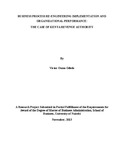| dc.description.abstract | The study sought to establish factors for successful implementation of business process
reengineering initiatives and determine the impact of the success factors on the performance at
Kenya Revenue Authority. Emphasis was on the following research objectives; to establish the
factors for successful implementation of business process reengineering initiatives in KRA and
to determine how business processes reengineering initiatives have impacted on KRA’s
performance. Primary data was collected through questionnaires distributed to the different
management cadres of KRA. Stratified random sampling was used to select 110 target
respondents. Data collected was analyzed by using frequencies, percentage, mean, standard
deviation and regression analysis, and then presented using tables, and charts. Results of the
study indicate that Kenya Revenue Authority implemented business process reengineering
initiatives in its operations. From the findings of the study, the respondents agreed unanimously
that key among the drivers for BPR was involvement of the customer/stakeholder which had the
highest rating. The performance dimensions which are improved by BPR include; customer
service, process turnaround time, cost reduction, improved technology, competitiveness and
revenue growth. The study’s major limitation was that the targeted respondents were all
employees of KRA, due to limited resources and time constraint only employees based in
Nairobi (Head Office) were considered. In conclusion, on the whole there was a positive impact
on the performance of KRA due to implementation of reengineering initiatives. Thus, other
organizations should not fear implementing radical changes which affect the entire organization,
as BPR can lead to overall improved performance. | en |

